Tariffs are clearly not a viable economic or political plan, and those leading the charge to roll them back will become the actual leaders of U.S. economic policy.
Written by: Noah Smith
Translated by: Block unicorn
U.S. stock markets continue to plummet as investors realize that Trump's outrageous tariffs will not be lifted anytime soon:
On Sunday evening, U.S. stock index futures fell as the White House remained defiant following President Trump's shocking high tariff rates imposed on most major U.S. trading partners, leading to a historic two-day stock market crash… Dow Jones Industrial Average futures fell 1,531 points, or 4%, on Sunday night, signaling another brutal trading day on Monday. S&P 500 futures dropped 4%. Nasdaq 100 futures fell 4%.
S&P 500 futures have dropped 15% in just three trading days. Calling this a "crash" is no longer an exaggeration. In just a few days, Trump's policies have caused over $5 trillion in U.S. wealth to vanish into thin air. If Monday's market develops as expected, that number could quickly turn into $10 trillion. And this is just in the first three days. Many investors still expect the tariffs to be temporary:
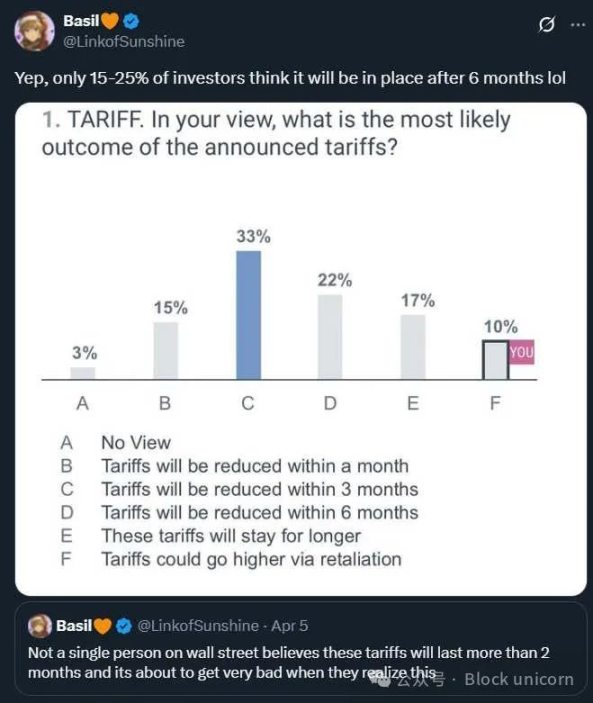
This means that the crash we have experienced may just be the beginning of what is to come.
The American public is panicking over this reckless economic destruction, and rightly so. Support for tariffs has never exceeded 50% and has now plummeted to rock bottom. The economy, jobs, and international trade have become the issues that Americans are most dissatisfied with regarding Trump, as has foreign policy:
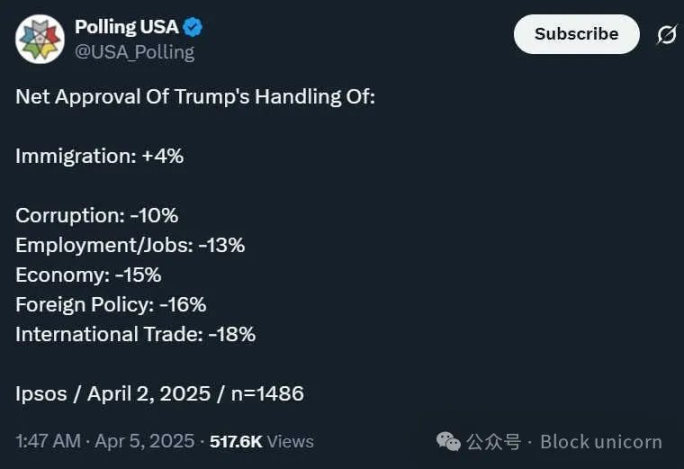
Negative sentiment towards U.S. government economic policy has surged to levels higher than during the Great Depression:
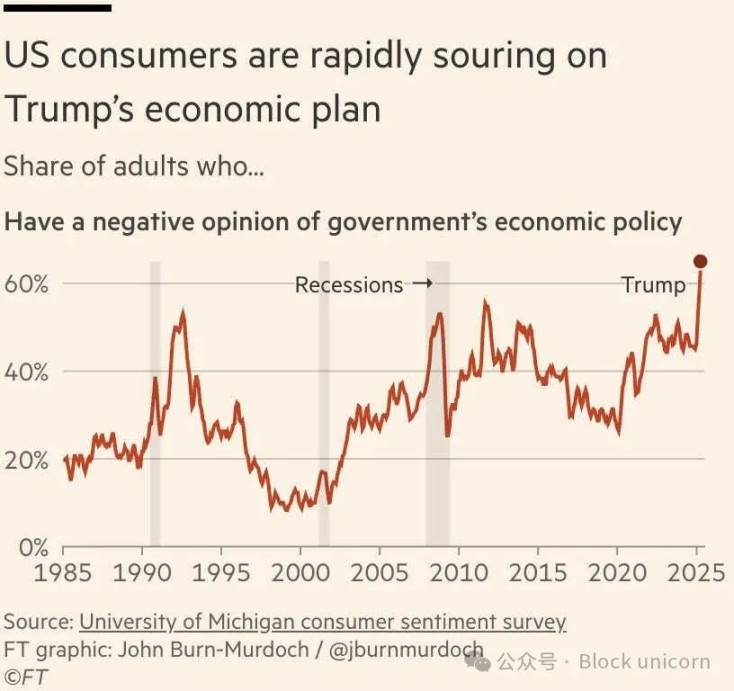
It's not just the stock market. Most Americans expect tariffs to have a negative impact on the real economy, meaning higher unemployment and declining incomes:
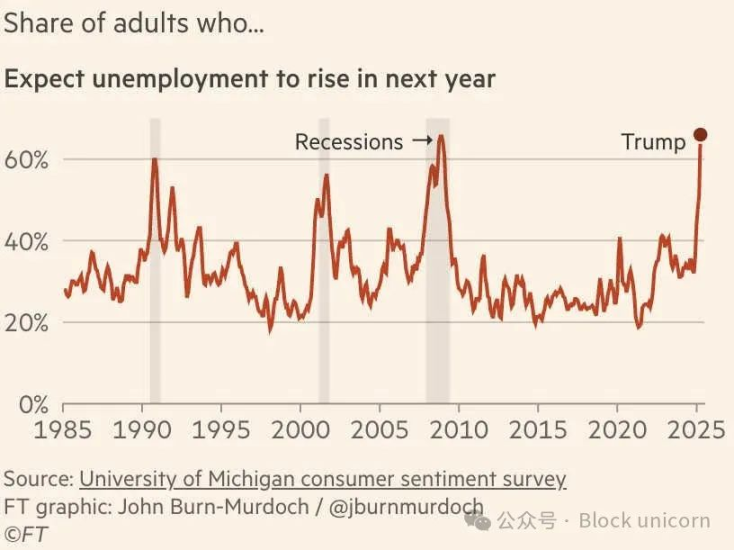
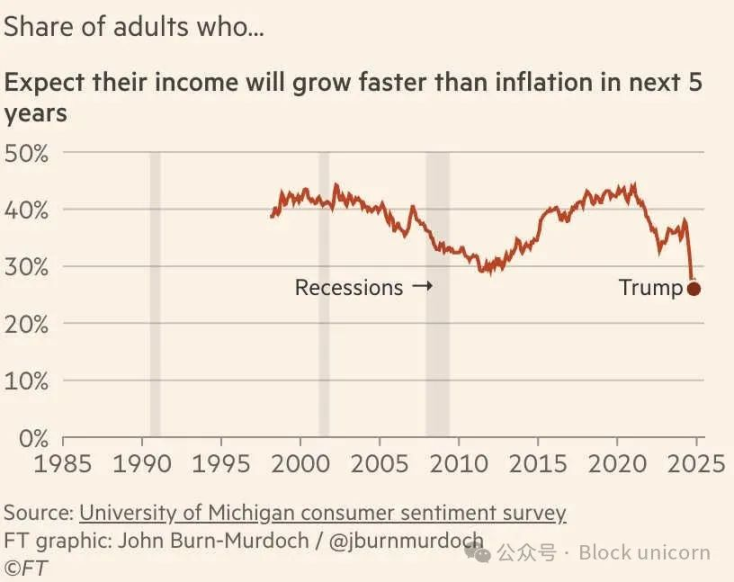
Private forecasting agencies are raising the likelihood of a recession in the near term. Prediction markets share the same view.
Meanwhile, the crazy "king" Trump is still bragging about causing the stock market crash:
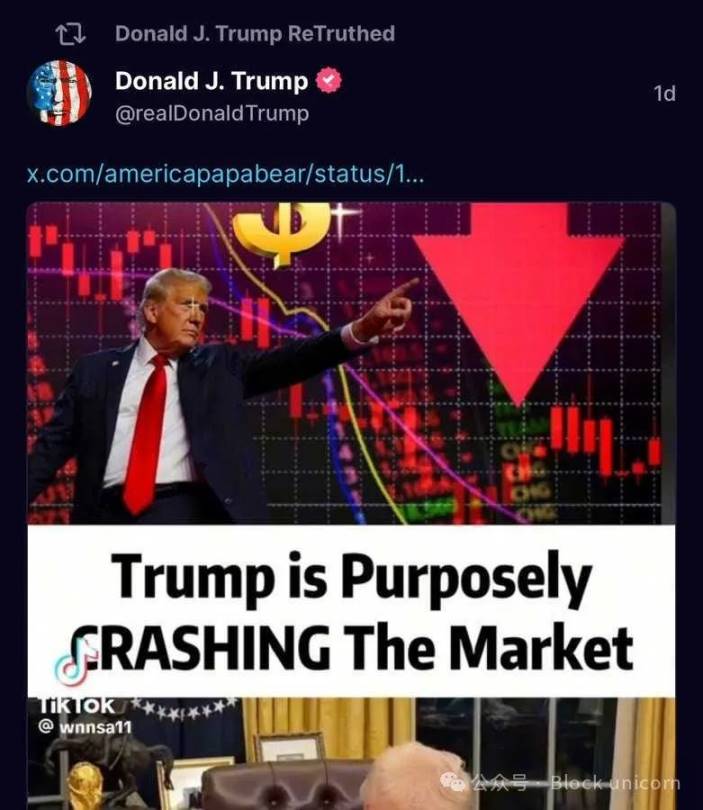
Even some of Trump's allies and supporters are starting to feel uneasy. Bill Ackman claimed, "We are heading towards a self-inflicted economic nuclear winter," and Elon Musk called for a zero-tariff free trade zone with Europe. Musk also criticized Trump's economic advisor Peter Navarro, who may be the most influential supporter of the tariff policy.
Now, it is important to remember that Congress can intervene at any time to stop this madness. The Constitution grants Congress the power to set tariffs, and Trump is able to unilaterally impose these tariffs only because Congress has granted the president this power through a series of laws. At any time, Congress can pass a new law to make these tariffs disappear.
In fact, there are currently at least two such bills being proposed—one by Senators Chuck Grassley and Maria Cantwell, and another by Representative Don Bacon. That's great! I hope they pass, even if Trump will veto them. If things get bad enough and Trump's approval ratings drop sufficiently, Democrats and Republicans could unite to form a two-thirds majority to override the veto and end this tariff nightmare.
But you will immediately notice that among the three legislators leading the charge against tariffs, two—Bacon and Grassley—are Republicans. Democrats are not at the forefront of the fight.
This does not mean that Democrats are completely silent. Many have issued statements opposing the tariffs, such as this one from Nancy Pelosi:
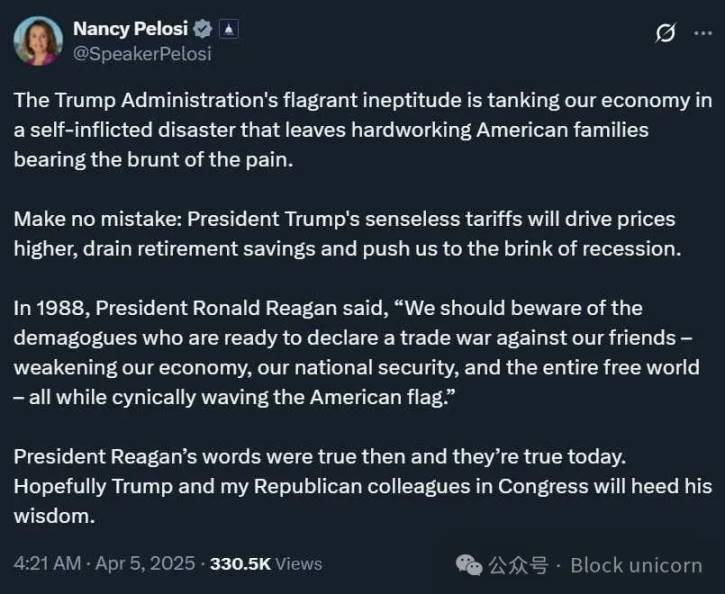
But so far, there has not been any fierce rhetoric like the progressive attacks on Elon Musk's DOGE. Bernie Sanders responded to DOGE with a "Stop the Oligarchs" tour that attracted large crowds. But his response to the tariffs has been cautious and ambiguous:
As someone who helped lead the opposition to disastrous, unrestricted free trade agreements with certain countries in Asia and South America, as well as other low-wage countries, I understand that we need trade policies that benefit American workers, not just the interests of corporate CEOs. This includes targeted tariffs, which can be a powerful tool to stop companies from outsourcing American jobs and factories overseas.
But the bottom line is: we need a rational, thoughtful, and fair trade policy. Trump's blanket tariffs are not the right approach. We do not need to impose a blanket and arbitrary sales tax on imported goods that will raise prices on the goods that the American people desperately need. We should do everything we can to lower prices, not make them exorbitant.
Some Democrats are even teetering on the edge of defending Trump's tariffs. Congressman Chris Deluzio from Pennsylvania issued a statement criticizing the implementation of Trump's policies but seemingly supporting the overall approach, calling for price controls to address inflation caused by the tariffs:
I support using tariffs as a tool against bad actors and trade cheaters. I support combining tariffs with strong industrial policy and worker-supportive policies, using them strategically to protect American jobs and consumers. I support actively renegotiating trade agreements like the USMCA to secure the best deals for hardworking Americans like those in western Pennsylvania… I do not support the decades-long Washington consensus on free trade that has destroyed American industry and jobs, leaving us with often-failing distant supply chains. This is a bad deal for people in our "Rust Belt" and other regions. I also do not support allowing foreign trade cheaters to exploit their workers to undermine American jobs… The president has the power to stop companies from using tariffs as a cover to inflate prices—why doesn't he use that power?
House Democrats released a video of Deluzio making a similar statement, adding some text that hints at limited support for Trump's overall approach:
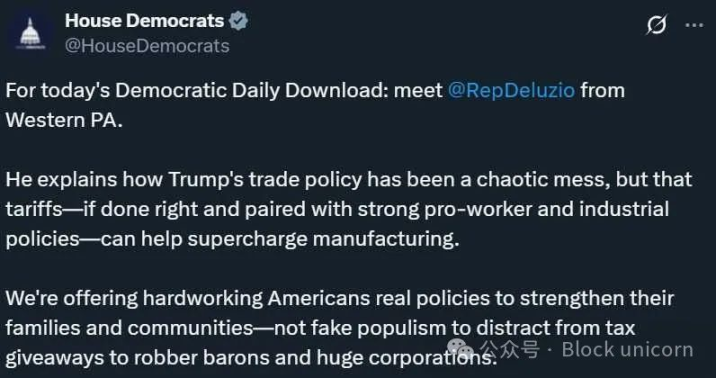
Frankly, this is crazy. No president has ever intentionally damaged the stock market like Trump, and it will soon wreak havoc on the U.S. economy. In the past century of policy blunders, only the Iraq War can be compared, and that disaster unfolded gradually over years. Democrats now have a golden opportunity to hammer Trump from every rooftop, riding a wave of unprecedented anger to achieve a comprehensive victory in Congress in the 2026 midterm elections. Yet, they issue bland statements, get bogged down in minutiae, and let Republicans lead the charge to defend American prosperity against their crazy "king."
What is going on? If this is a strategic, thoughtful move by the Democrats—to let the Republican coalition tear itself apart and then capitalize on their division—I would expect Democrats to simply issue more statements like Pelosi's, rather than making tangled, half-defensive remarks like Deluzio's. Instead, the current situation seems clear: Trump is actually implementing the great counteroffensive against neoliberalism that progressives have dreamed of for decades, and Democrats do not know how to respond to this rapidly evolving disaster.
Trump's embrace of tariffs is, in fact, a political reversal. For decades, it has been Democrats and the labor left who have worried that trade agreements are undermining organized labor in the U.S., sending American jobs to low-wage countries, and harming the environment. In recent years, it has been progressives who have identified neoliberalism—including free trade as one of its main pillars—as the core of America's problems.
"Anti-neoliberalism" is the central tenet that has coalesced the modern progressive movement. Socialist critics throw the term "neoliberalism" at anything they dislike. Progressive think tanks like the Roosevelt Institute and the Hulett Foundation have funded thinkers and activists dedicated to determining what comes after neoliberalism (I have participated in some of these events myself). The Warren movement—a project of intellectual elites with considerable influence in the Biden administration—has begun to put this concept into practice, adopting key policy tools like antitrust, price controls, and increased support for unions. More security-focused liberals, like Jake Sullivan and Jennifer Harris, are more concerned with industrial policy (which I also strongly support). The Sanders movement—a populist movement that has influenced policy but never held power—calls for more radical policies, including punitive high taxes and industrial nationalization.
You will notice that tariffs and trade deficits do not stand out prominently on these lists. Anti-neoliberalism is indeed skeptical of free trade; Biden has imposed strategic, targeted tariffs on specific Chinese products. But tariffs have never been a very important part of the anti-neoliberal ideological framework, and few progressives cite trade deficits as evidence of America being taken advantage of by other countries. Even the most ardent Bernie supporters might hesitate at the level of trade destruction that Trump is now attempting to implement (Bernie himself certainly would).
But if the progressive anti-neoliberal movement has been slowly moving in the slow lane, Trump has zoomed past in his sports car. Trump has now seized the banner of anti-neoliberalism and is pushing it in a direction that the former leaders of that movement never dreamed of.
Now, progressive leaders are worried that if they take up the banner of free trade to oppose Trump and succeed, their entire anti-neoliberal agenda will be discarded along with the tariffs. I think this is a reasonable concern. Trump has made most Americans view free trade more positively, and as the economic destruction of the tariffs spreads, the backlash may intensify:
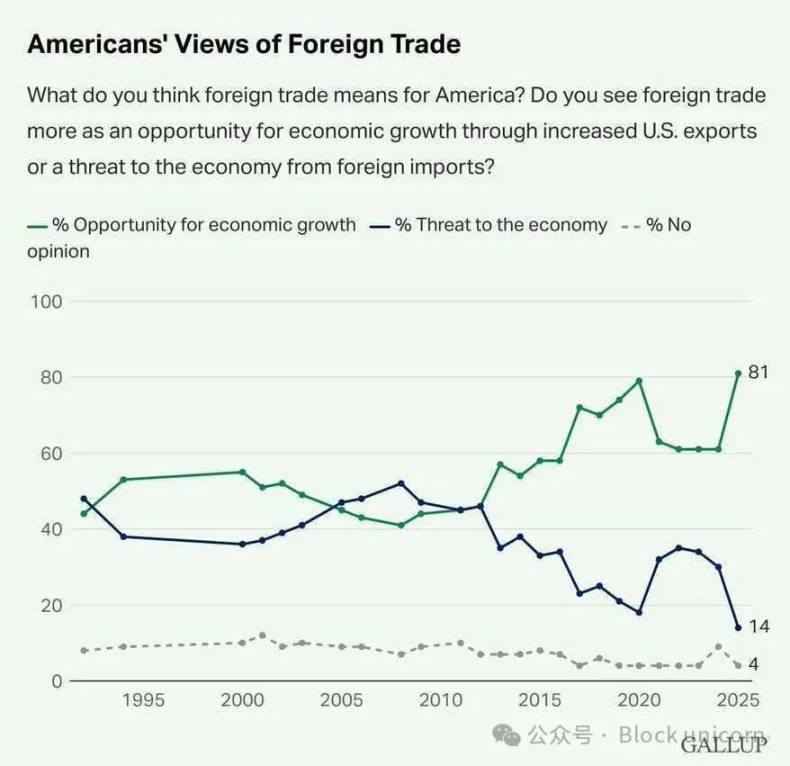
We may indeed be witnessing a generational shift back towards free trade. This will undoubtedly jeopardize the anti-neoliberal agenda that progressives have held for a generation.
This possibility has left anti-neoliberal thinkers and activists somewhat flustered, and they are becoming a bit incoherent:
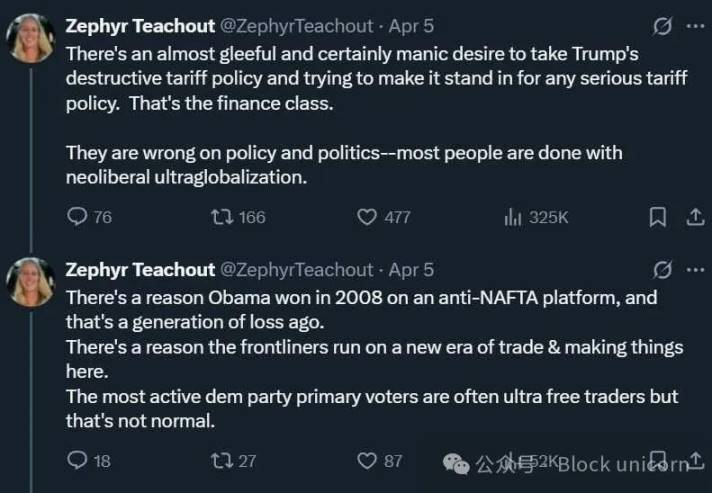

This approach will lead to a complete failure of the progressive movement. Not only because Democrats adopting this attitude will let a once-in-a-lifetime opportunity for power slip through their notoriously clumsy hands (though that is indeed true). More importantly, by refusing to explicitly condemn and oppose the most severe act of economic self-destruction in modern American history, progressives will hand a significant ideological victory to their neoliberal opponents within the party and throw their nascent revolution into the dustbin of history.
Perhaps some progressives imagine that after Trump causes destruction, Democrats will regain power but retain some of Trump's tariffs. This has happened before— for example, Biden retained the tariffs imposed on China during Trump's first term. Progressives might comfort themselves by thinking that Trump is moving the Overton window for them, and after he leaves, they can quietly return and propose a milder version of anti-neoliberalism as a compromise.
I highly doubt this will happen. The reason the tariffs from Trump's first term were retained is that they did not cause too much damage. When Americans truly suffer economic pain—such as after the 2008 financial crisis—they tend to oppose anything perceived to have caused their suffering. After the financial crisis, they turned against the financial industry, resulting in the strictest regulations on that sector since World War II. The Sarbanes-Oxley Act after the Enron scandal may have been an overcorrection in regulating corporate accounting. And after the Smoot-Hawley Tariff of 1929—far smaller than what Trump is proposing now—free trade became a tenet for generations.
After all this, if Americans believe that "anti-neoliberalism" means tariffs, they will build a shrine to Milton Friedman in their front yards. If industrial policy, antitrust, and higher taxes are associated with tariffs, those will also be discarded. Public opinion will be filled with statements like this:

If progressives and the Democrats who listen to them want to salvage anything from their agenda—I agree that some important parts are worth salvaging—they must propose something better than "Well, if implemented properly, tariffs are good, but Trump's tariffs are poorly executed, blah blah blah."
Fortunately, it should be easy to attack Trump's tariffs with maximum force without discussing "neoliberalism" or other grand ideological concepts. They can say: tariffs will crush the American working class; they can also say: tariffs will greatly accelerate America's deindustrialization, leaving factory workers unemployed; they can even say: tariffs will make the middle class poorer, increase unemployment, destroy retirement savings, and erode purchasing power.
You don't have to connect anything to "neoliberalism," "elites," or "the financial class." You don't have to frame it as part of some broader ideological competition. This line of thinking may resonate with the Democratic staffers managing legislators' Twitter accounts, but ordinary voters really don't need much more information than "Tariffs are bad, therefore Trump is bad." Tariffs have never been a significant part of the progressive agenda; Franklin D. Roosevelt significantly lowered tariffs through the Trade Agreements Act of 1934.
And you can still say that industrial policy and antitrust are good! You don't have to link these things in your rhetoric, even if in your own thinking they are connected through some "neoliberal" theory. Just set tariffs aside and spare the American people from having to endure a university lecture on ideology.
Moreover, Democrats really need to stop trying to turn this into a class struggle. Some Democrats weakly attempt to claim that the rich will benefit from tariffs:
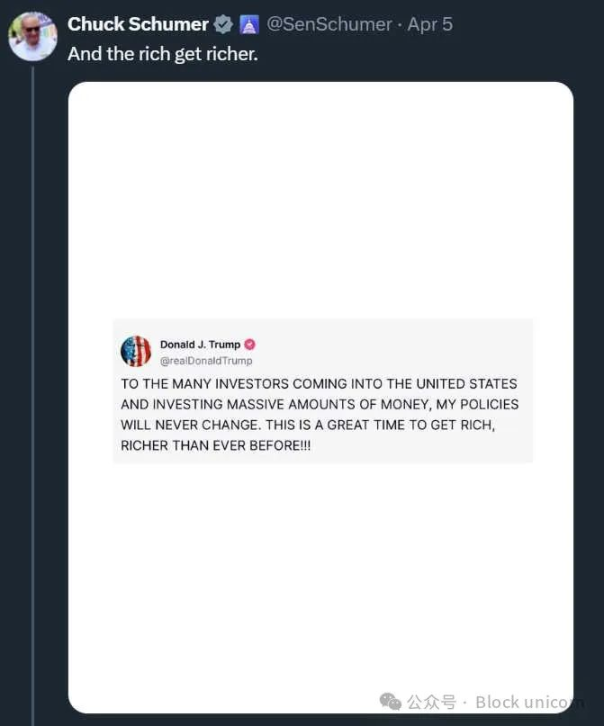
No one is foolish enough to believe this. Everyone knows that the rich own a lot of stocks, and when the market crashes, the rich will suffer significant blows.
Class struggle has always been a weak platform for trying to reclaim the country. But trying to force tariffs into the narrative of "billionaires against everyone else" is simply absurd. This is truly one of those Pareto improvement situations they teach you in Economics 101, where a foolish policy harms both billionaires and working-class Americans. When you stop a madman from drilling holes in the hull, the rising tide does indeed lift all boats.
In short, Democrats and progressives need to take the lead in the fight against the mad "king" and his tariff madness. Tariffs are clearly not a viable economic or political plan, and those leading the charge to roll them back will become the actual leaders of U.S. economic policy. Go be those people.
免责声明:本文章仅代表作者个人观点,不代表本平台的立场和观点。本文章仅供信息分享,不构成对任何人的任何投资建议。用户与作者之间的任何争议,与本平台无关。如网页中刊载的文章或图片涉及侵权,请提供相关的权利证明和身份证明发送邮件到support@aicoin.com,本平台相关工作人员将会进行核查。




